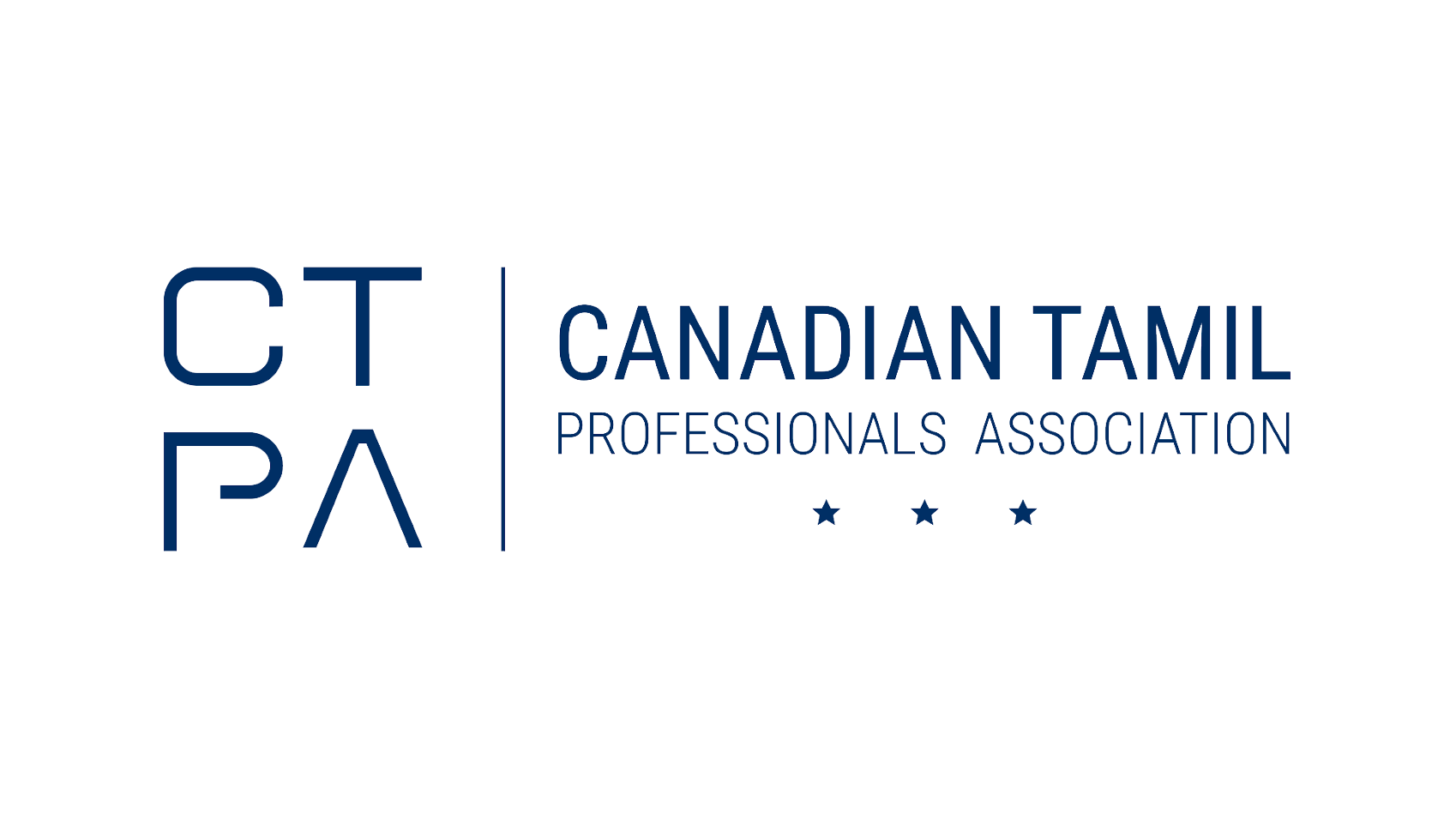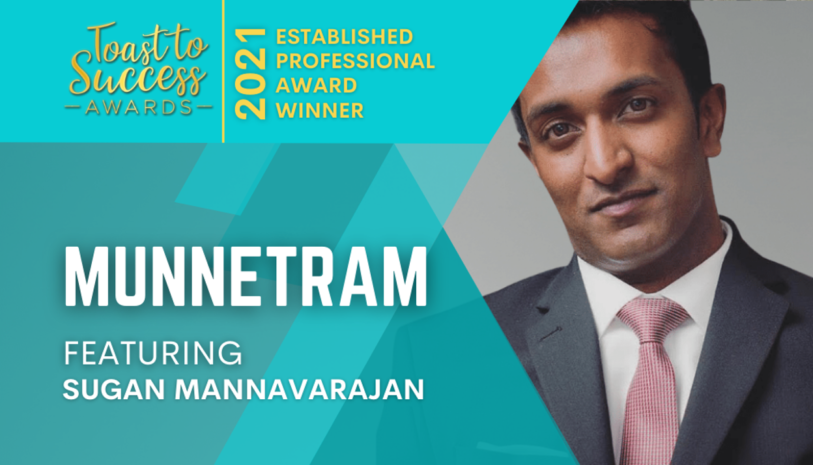Sugan Mannavarajan: Toast To Success Established Professional Award Winner
Sugan Mannavarajan is a community builder, amplifier and futurist who currently works as the National Relationships Manager in Innovation & Partnerships for Canada Housing and Mortgage Corporation (CMHC). Over the course of his career, Sugan has helped spearhead multi-billion dollar initiatives to support Canadians. As the recipient of the 2021 Toast to Success Award for an Established Professional, CTPA had the chance to talk to Sugan about his professional journey, life experiences and relationship with his Tamil identity.
How would you describe your job?
I’m currently focused on the housing sector as a National Relationships Manager for CMHC’s Innovation & Partnerships division. I take my tenure as a public servant very seriously. However, I do not like being defined by ‘my job’ or title; I am defined by my professional purpose as a community builder, an amplifier and a futurist. My personal and professional purpose are very aligned here- “to help unlock our collective potential”. How do I do that? When looking at our societal needs as a whole, housing stands out as not only the cornerstone of our communities, but also as the foundation to human development – think Maslow. To me, access to housing can help accelerate our socio-economic conditions and our society’s overall quality of life.
Could you tell us about your professional journey?
I started pretty young on Bay Street in capital markets and also doing other side-gigs and projects while completing my urban planning degree at Ryerson University. I was told by one of my mentors that I’m a ball of energy, but that as I get older, I’ll slow down, so I shouldn’t waste that energy and potential now. I pushed myself to maximize my productivity by managing my time and seizing opportunities available in my environment. Around the same time, I was exposed to people experiencing homelessness as I was predominantly downtown Toronto and had grown up in the suburbs. I started spending time with homeless folks and learning about their worldview. You can learn just as much, if not more, from a person experiencing homelessness as you can from an executive sometimes – it just depends on how you’re engaging and listening. As things progressed, I began to see glimpses of the Bay Street world that didn’t align with me. I was fortunate to have the guidance of these giants of industry who could show me the ropes, explain at an early age to not only chase the money, and that a big cheque wouldn’t bring me fulfillment if I hated my job.
After I graduated from urban planning, I got the opportunity to work in Niagara to oversee the first wave of federal-provincial funding in affordable housing. That changed my life because I was on the ground, in the trenches, working to get those projects on the go. I will never forget the opening of my first affordable housing project. This young girl came up to me with her baby and said, “Hey Sugan, I heard you were the one who really made this happen, not the guys cutting the ribbons over there.” When I told her “yes”, she started crying and said, “I’m growing up with my baby – it’s hard times for us. This housing gives me hope for our future.” How do you put a price on that level of impact? That experience really resonated with me, and made me want to be more involved in affordable housing.
Could you tell us about your involvement with Canada Mortgage and Housing Corporation (CMHC)?
When I arrived at CMHC I started off as a Senior Policy Analyst. I was fortunate to be heavily involved as the policy pen in the creation of Canada’s largest rental construction finance initiative, which was the first of its kind to stimulate supply of affordable housing. Subsequently, I was a key contributor to Canada’s first ever National Housing Strategy, which I’m very proud of. During this time, I was a team lead in the design of the Federal Lands Initiative, where surplus federal lands are made available for affordable housing.
I’m truly grateful for the opportunity to work on these types of impactful projects. I work with CMHC because they’re oriented in a position to best help me do what I want to do better, which is to impact communities at scale in a positive manner. It’s an organization I adore helping to push forward.
Why is affordable housing so important?
Our home is our sanctuary. It is unfortunate that the harsh reality is that many Canadians are facing housing affordability challenges. On top of that, we arguably often over-compartmentalize the situation and overlook the inherent intersectionality it presents in our lives. For example, from a business perspective, is the productivity of your employees impacted by the housing affordability of where you operate? Is the performance of your employees impacted if they can’t make ends meet? Affordable housing is also a social determinant of health, and impacts mental health in particular. In addition, it impacts our local economies and job market, our environmental impact and energy use, and contributes to the diversity of our communities.
Could you talk about your five years living in the Canadian Arctic?
Unfortunately just prior to leaving for the Arctic, I experienced a serious accident. During my time off I started reflecting about the type of person I was becoming, and how my peers and I were living in what felt like a “box” in Toronto. The idea of leaving my safety net, my community and venturing out into the unknown was the draw for me to move up North. I like to practice forced personal growth. Also as a Canadian-born Tamil, it is very important to me that our diaspora understand this land; I wanted to widen my Canadian experience and be exposed to the richness of our culture and landscape. I was based in Yellowknife, but had the privilege to go to almost every community in the North, some as small as fifty people. I also got to meet Indigenous elders and discovered many commonalities between our cultures – like the ceremonial use of smoke.
I started off in commercial development with the territorial government; having exposure in residential development, I wanted to better understand other facets of the real estate sector. Later, I transitioned into strategic policy and had a unique opportunity to work directly for the minister and the deputy minister, so I got to see both the political and bureaucratic arms; I had a view of the whole machine so to speak. I also sat as a member for various boards at the time, keeping a foot in housing, municipal government and philanthropy. I’m a firm believer that we need to have respected governments, responsible businesses and robust community allies, all working together to create solutions Canadians need. When our communities are doing well, everyone is doing well.
What advice do you have for emerging professionals?
Listen, we all have various pressures – things that push us and things that pull us. Do you want to fit in or stand out? In the end, just be authentic; have the courage to be yourself. Do what you feel is the best way for you to express yourself for the limited time that you’re here. Stop doing things for extrinsic reasons and orient yourself from intrinsic motivations. You should feel like you’re rewarded just because you’re doing what you like. Your quality of work will be better because it’s natural. You’ll be able to go longer, be more creative and work from a space of passion. You’ll likely outwork others, because to you, it won’t feel like work. I’m a firm believer that passion pays in many ways; so deeply investigate what you value – start there. When you’re oriented that way, I find things come more easily to you because you’re more aligned.
What is your relationship with Tamil identity?
I am a Sri Lankan Tamil born in Canada. My western diasporic identity is merely an extension of the evolving cultural experience of our people. As we are relatively new to Canada, our experiences here add to the expansion of that “Tamil identity“. There is this perceived challenge often brought to my attention: am I too Tamil or not Tamil enough? It makes me laugh a bit when I think about it. Who’s judging? Who is the authority? For me, I have accepted myself as my own authority. I am a Tamil having a western experience – who can tell me I am not? You see, culture is fluid, and not fixed. I mean look at other more established Tamil diasporas like in Malaysia or Singapore; they are Tamil, but have also uniquely augmented the culture for their own over time. Tamil culture is a component of my identity that I enjoy and influences my experiences in Canadian society because it’s in the back of my psychology from childbirth. My Tamil birthright has enabled me to inherit experiences, values, and insights which I appreciate greatly. This being said, one could also argue that our experiences here contribute and shape the conversation of our evolving collective identity through its western expression. That’s why organizations like CTPA are so important: you have Tamil professionals sharing their diverse perspectives. In the end, we’re all learning what it means to be an ancient seed growing in a new land.

